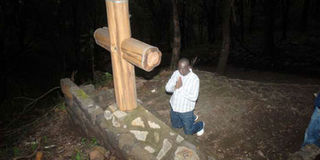Changing the words of ‘Our Father’ prayer

A faithful says a prayer at the National Marian Shrine in Subukia, Nakuru in 2012. PHOTO | FILE | NATION MEDIA GROUP
What you need to know:
- The change has nothing to do with changing the words that Jesus used when teaching his disciples how to pray.
- We can never change the words of sacred Scripture, much less the words of our Lord and Saviour Jesus Christ.
Many Christians have been asking about the change Pope Francis recently introduced into the Lord’s Prayer. How can anyone change a prayer that comes from Jesus Christ?
The change has nothing to do with changing the words that Jesus used when teaching his disciples how to pray. We can never change the words of sacred Scripture, much less the words of our Lord and Saviour Jesus Christ.
REVELATION
St John wrote in the Book of Revelation a phrase that applies to the whole Bible: “If anyone adds anything to them, God will add to him every plague mentioned in the book; if anyone cuts anything out of the prophecies in this book, God will cut off his share of the tree of life and of the holy city, which are described in the book.”
The reason for the change has nothing to do with trying to change what’s in the Bible. Instead, it’s the age old problem of translation.
The Our Father prayer in the pages of the New Testament comes to us in Greek. To complicate matters, Jesus was probably not speaking Greek when he taught the prayer to his disciples.
He was most likely speaking in Aramaic, which was his mother tongue and the language common to all Jews of Galilee at that time.
BIBLE
Everyone in the modern world faces a problem when it comes to reading anything in the Bible. The words need to be translated. In our case, that means translating the Greek of the New Testament into English, including the Lord’s Prayer. Or in the case of the Christians living in Italy, translating the prayer into Italian. Pope Francis changed only the Italian translation.
One phrase in the Our Father is particularly difficult to translate. “Lead us not into temptation.” Why this particular English translation was adopted centuries ago is not important. What is important is to understand why Pope Francis wanted a change.
We believe that God never tempts us. As the Letter of James says: “Never, when you are being put to the test, say, ‘God is tempting me’ ... Everyone is put to the test by being attracted and seduced by that person’s own wrong desire.”
TEMPTATION
The Greek phrase could be translated into English using words similar to the ones Pope Francis chose for Italian: “Do not let us fall into temptation.” This matches St Paul’s explanation: “None of the trials which have come upon you is more than a human being can stand. You can trust that God will not let you be put to the test beyond your strength, but with any trial will also provide a way out by enabling you to put up with it.”




